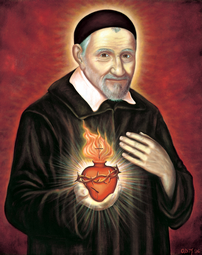Lives of the Saints
Our Models and Protectors
Spiritual Bouquet:
July 19

O.D.M. pinxit
Saint Vincent de Paul
Founder of the Lazarist Fathers
and the Daughters of Charity
(1576-1660)
Saint Vincent was born in 1576 near Dax, south of Bordeaux, of a poor family which survived by means of their labor. It seemed that mercy was born with him. When sent by his father to the mill to procure flour, if he met a poor man coming home, he would open the sack and give him handfuls of flour when he had nothing else. His Christian father was not angry; seeing his good dispositions, he was sure his son should become a priest, and placed him as a boarding student with a group of religious priests in Dax. Vincent made rapid progress, and after seven years of studying theology at Toulouse and in Saragossa, Spain, was ordained a priest in 1600. He always concealed his learning and followed the counsel of Saint Paul who said, I have wanted to know nothing in your midst but Jesus Christ, and Jesus Christ crucified.
Soon after his ordination, he was captured by corsairs and sold as a slave in Tunisia. He converted his renegade master, and escaped with him to France. Then, after a time of study in Rome, he returned to Paris and took for his spiritual director Abbé de Berulle, a famous director of souls. This servant of God saw in him a priest called to render outstanding service to the Church, and to found a community of priests who would labor for its benefit. He told Saint Vincent this, that he might prepare himself insofar as was humanly possible. When Saint Vincent was appointed chaplain-general of the galleys of France, his tender charity brought hope into those prisons where hitherto despair had reigned. When a mother mourned her imprisoned son, Vincent put on his chains and took his place at the oar, and gave him to his mother.
His charity embraced the poor, the young and the aged, the provinces desolated by civil war, Christians enslaved by the infidels. The poor man, ignorant and degraded, was to him the image of Him who became as a leper and no man. Turn the medal, he said, and you will see Jesus Christ. He went through the streets of Paris at night, seeking the infants and children left there to die — three or four hundred every year. Once robbers rushed upon him, thinking he carried a treasure, but when he opened his cloak, they recognized him and his burden, an abandoned infant, and fell at his feet. Not only was Saint Vincent the providence of the poor, but also of the rich, for he taught them to undertake works of mercy. When in 1648 the work of the foundlings was in danger of failure for want of funds, he assembled the ladies of the Association of Charity, and said, Compassion and charity have made you adopt these little creatures as your children. You have been their mothers according to grace, when their own mothers abandoned them. Will you now cease to be their mothers? Their life and death are in your hands. I shall take your votes; it is time to pronounce sentence. The tears of the assembly were his only answer, and the work was continued.
The Priests of the Mission or Lazarists, as they are called, and thousands of the Daughters of Charity still comfort the afflicted with the charity of their holy Founder. It has been said of him that no one has ever verified more perfectly than Saint Vincent, the words of Our Lord: He who humbles himself shall be exalted... The more he strove to abase himself in the eyes of all, the more God took pleasure in elevating him and bestowing His blessings on him and on all his works. He died in 1660, in an old age made truly golden by his unceasing good works.
Reflection: Most people who profess piety ask advice of directors about their prayers and spiritual exercises. Few inquire whether they are not in danger of damnation from neglect of works of charity. Let us never forget the terrible foretold words of the Final Judge: Depart from me, workers of iniquity; I was hungry, and you did not feed Me; I was without shelter, you did not take Me in...; I was sick, and in prison, and you did not visit Me, etc. (Cf. Matt. 26:31-46)
Les Petits Bollandistes: Vies des Saints, by Msgr. Paul Guérin (Bloud et Barral: Paris, 1882), Vol. 8; Little Pictorial Lives of the Saints, a compilation based on Butler's Lives of the Saints, and other sources by John Gilmary Shea (Benziger Brothers: New York, 1894)